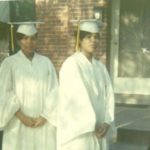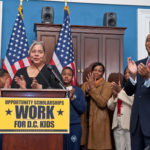Category Archives: Virginia’s History
One Child: Why I Decided to Fight for Education Options for Children
My fight for school choice for all children started with a much smaller population – my own three children, and more specifically, my youngest son.
Life was challenging, raising three children in Washington D.C. in the 1990s. There was always the worry of the mean streets attracting my children.
I decided as a young mother that I would do all I could to make sure that did not happen and I made sure to stay closely in my children’s lives. That wasn’t always an easy task. I was a single mother, working hard to make ends meet while still being an involved mother. It was hard but my two older children Michael and Miashia found their places in life and school and, working together as a family, they excelled.

With my daughter, Miashia
My youngest son, William, started off with some speech problems and as happens to many young black and brown boys in the inner city, the education system wrote him off as not capable of learning. This started a downward spiral for him that eventually started to pull him towards the rough streets.
I watched him align himself with the negative influences of our community. Drugs were prevalent around our neighborhood and the drug dealers targeted our young boys to work for them with the promise of expensive items (shoes, clothes, etc.) that they knew their single, struggling parents (mostly mothers) couldn’t afford. I saw my son choosing to run with the kids who were getting in trouble and when I asked him why, he told me that he felt safer being a part of the thug world. He said that smart kids got beat up. This was a real fear since we knew of at least one child who had been attacked because he was acting “too smart.”
William began skipping school and getting into all kinds of trouble in school with teachers and administration. He truly believe that if he acted “bad,” he would be safe. He seldom did homework because he felt like it didn’t matter to anyone whether he passed or failed.
Though a really good kid, it became harder for me to rein William in and I feared for him. When he was 13 years old, a neighbor offered us a partial scholarship to attend a private school. It meant that I would need to get a second job to pay the remaining amount, but it was a way out for him and I knew I would do whatever I could to keep him safe and ensure him a quality education. I took an evening job as a recording studio night auditor. After a nine hour day at my normal job, I’d work three nights from 9 p.m. to midnight. It was the only way I could afford this opportunity for my son and so I did it with gratitude.

With my son William in the spring of 2018
My neighbor saw something special in my child and wanted to help. He had grown up in our neighborhood, left for a time and returned with his family. With the help of his parents, he had done well for himself in real estate. Upon his return, he saw how so many of these fatherless boys needed support from a man who believed in them and he helped them learn work ethics, working with him or with other business people he knew. With my William, this neighbor truly believed a quality education was what he needed. And he was right.
My son excelled in his new school and it was the beginning of a happy ending for our family. Yet as happy as we were, my neighbors children were not doing so well — and their neighbors’ children weren’t either. It became clear to me that something needed to be done to help all children have better educational opportunity, regardless of where they lived or where they were districted to attend school. I knew that I wanted to help and when the opportunity arose to speak out for the district’s low income and working class families, I found my voice and ultimately was joined by thousands of parents who wanted only the best for their children, too.

At the beginning, I had no idea where to start. I attended D.C. Board of Education meetings but found out early on that I was not going to be heard. Then in August 1997 I was directing a Summer Program in Southeast DC at the Fishing School, a faith-based program for low income children and got a call from the Center for Education Reform asking to speak with the parents of the children we served about a possible scholarship program.
I planned the meeting, no parents showed up and the CER Representative and I realized that the most direct way to garner attention for more educational opportunity would be to share my story of my son’s experience after receiving a scholarship.
I spoke for the first time before U.S. Representative Dick Armey and the House Education and Taskforce Committee, and the members actually listened to what I had to say. It was empowering. I knew at that moment that I could really make a difference and began to go out into the community and talk to parents about their dreams and hopes for the education of their children.
I didn’t set out to fight for school choice or speak up for other children; I started out as an everyday mother, wanting the absolute best in opportunities for my kids. I quickly found that drive was reflected in the hearts and minds of other parents who also felt trapped in an educational system that was failing their children.
I decided to fight for school choice because of MY child but I continued to fight for the children of others who deserved so much more than they were receiving.

My kids, with their kids and loved ones

